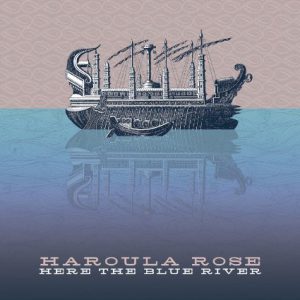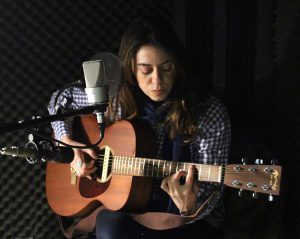Haroula Rose's River of Imagery in the Echoes Podcast
Podcast: Play in new window | Download
Subscribe: RSS
Listen to the Haroula Rose interview above, or download it from iTunes.
Haroula Rose’s music flows like the title of her new album, Here the Blue River. Her lyrics are suffused with water imagery and the title comes from a poem by Ralph Waldo Emerson. 
“Yeah, there’s this poem called ‘The River’ that has become my favorite poem actually, that I’ve read in a long time,” Haroula explains. “Because it sort of sums up how you’re born, you live this life and then you die. And the last line of it is sort of like how nature will give your grave its funeral shade in a way, and it’s just the imagery is really beautiful, and it has to do with like rivers, and the river of life, and what it leads to.”
She elaborates, “And you know, on the back of the record is a picture that NASA took of the Rio Negro and there’s all these things called meander scars, that I didn’t even know existed, but they’re where the river has trodden its path and you can still see all of these like grooves in the earth. And so I just through it was kind of neat that like you come and you go and nature still stays. And that’s kinda what that poem is about.”
One of her songs, “Moon & Waves”, doesn’t just use water as a metaphor, but seems to be about finding the ebb and flow of water imagery.
“Well, I think when you really think about, it’s kind of what everyone is made of, a lot of us,” she philosophizes, “then the way that like the moon relates to the earth and how there’s all this pushing and pulling all of the time that kind of makes things stay as they are. I was just thinking about it as being this like force that we don’t necessarily think of that kind of rules everything.”
Haroula Rose sits in the Echoes studio with her guitar, she’s a diminutive woman with dark, penetrating eyes and dark brown hair streaming past her shoulders, revealing her Mediterranean roots. Haroula Rose is her real name, but it isn’t her full name.
“My name is Haroula Rose Spyropoulos,” she clarifies.
That’s a mouth full unless you’re parents are Greek, which Haroula’s are. That music was around her house all the time growing up.
“A lot, you know, they played music a lot growing up,” she fondly recalls. “There was like a radio that always played old folk music and the modern more pop music, and I don’t know, I just think it probably made them feel more at home or something and it was nice to hear.”
She still remembers some of that music and you can hear a little bit of that sound filtering in to songs like “The River (Drifting).”
Moving to Los Angeles, Haroula found life as a working musician hard, until she fell into singing on commercials.
“Completely by accident,” she discloses. “Just after school, after college, I was playing some songs, and at that point I wasn’t really confident enough to like play my own songs, and I was playing some covers and stuff and someone heard me sing. And they said I want you to come in for, to sing on some commercials. And I was like yeah, yeah, whatever, and then they, they actually did follow up on it, so I sang some stuff. I think it was for like a phone company, like Nokia or something. Then that same place hired me to work there at this recording studio. So you realize there’s this whole world, you know. I didn’t know you could do any of this stuff for real.”
Haroula Rose has also been fortunate to find many of her songs placed on TV shows and films including Still Alice, American Horror Story, How I Met Your Mother, and Being Human.
“I’ve had a lot of luck with songs of mine being used in TV shows and movies” she reveals, adding, “‘Walk Away’ is going to be on this show called iZombie on Tuesday night, on the season finale. So it’s great because if you’re not touring all of the time and you still want to keep making records, it’s really nice because it allows you some level of income to be able to do that, you know, which is great.”
For Here the Blue River, Haroula Rose has shifted gears. It’s a more atmospheric album than her debut with lyrics that are a little more oblique, sung in a voice that has gotten more mature.
“I was using a different part of my voice.” She specifies, “I was singing a little bit lower because you write differently and so that’s just what came out. It was a little bit darker and a little more mysterious, and I don’t know, I like it better.”
Amidst its water imagery, you’ll still finds songs of heartbreak, like “Songbird”. During her live session on Echoes, I asked her about the origins of the tune.
“You know, I don’t know where that song came from, but it was funny,” remembers Haroula. “In Burlington the other night there was this little kid who was there with his dad, and it was so cute because afterwards he was like Daddy, I don’t think that that song is really about a bird. It was kind of cute. Anyway, yeah, I don’t know where that song came from. It seemed like if you, if you love something and you’re supposed to let it go, when are you supposed to like hold onto something and try to make it work. So I guess that could relate to any kind of relationship.”
“Are you avoiding the personal here?” I joke.
“I mean I don’t know–yeah, maybe,” she hesitantly replies. “Calling me out.”
Whether drawing from her own life on “Songbird”, poetry on “Moon and Waves,” or novels like Bonnie Jo Campbell’s Once Upon a River which inspired the song “Margo,” Haroula Rose taps into a deep emotional undercurrent. If her first album was almost a happy children’s recording, Here the Blue River is from an adult with life experiences.
“There’s someone who once told me that as a singer-songwriter, as a musician, your job is actually to break people’s hearts,” she recalls, cleverly adding, “Which I thought was kind of a great job description.” She may not want to put that on a résumé.
Haroula Rose may break your heart but she’ll do it beautifully. Her new album is Here the Blue River on Thirty Tiger Records.

